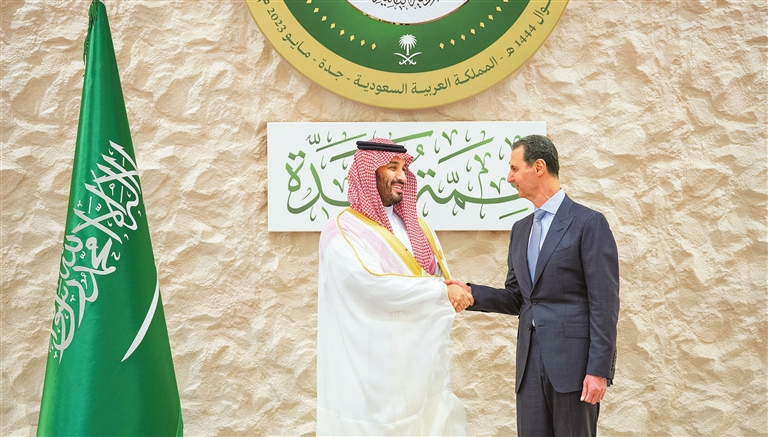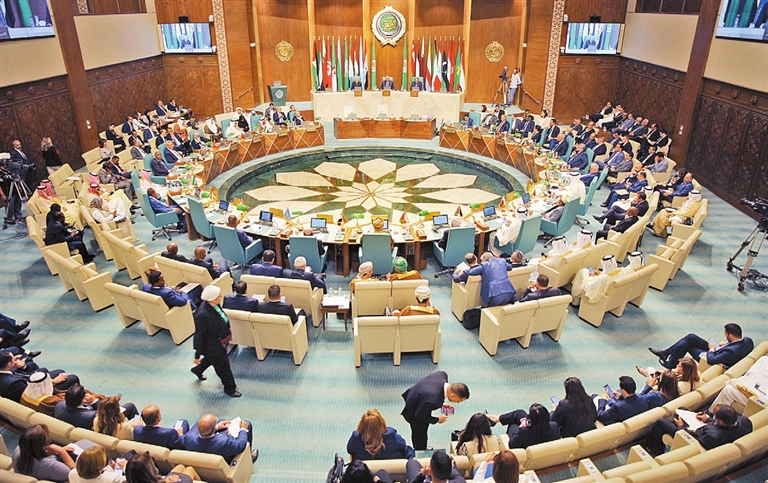

AFTER being ostracized for 12 years, Syrian President Bashar al-Assad made a comeback to the Arab League (AL) Summit held in the Saudi city of Jeddah on Friday amid a growing Arab reconciliation trend at a time when the U.S. influence wanes in the Middle East. Receiving a warm welcome from Saudi Crown Prince and Prime Minister Mohammed bin Salman Al Saud, who greeted him with hugs and kisses, Assad hailed the summit as a “historic opportunity” to address crises across the region. “I hope that it marks the beginning of a new phase of Arab action for solidarity among us, for peace in our region, development and prosperity instead of war and destruction,” Assad told summit attendees. Assad also called on the 22-member body to solve problems internally instead of relying on outside help. Syria’s return The return of Syria, which was suspended from the Arab League in 2011 when civil war broke out in the country, signaled the culmination of the recent rapprochements among Arab states. In the past two years, a wave of reconciliation swept across the Middle East, as Arab countries sought more independence in foreign policy and mended fences among themselves to regain Arab solidarity to deal with common challenges amid the gradual U.S. retreat from the region. The disgraceful U.S. troops pullout from Afghanistan in 2021 further eroded many Arab countries’ trust in Washington’s security guarantees. As the Syrian government gradually regained control of its territory with Assad holding on to power despite the 12-year war, Arab countries need Syria’s cooperation in dealing with the return of Syrian refugees and curbing the country’s rampant drug trade that has got its neighbors in trouble. Riyadh’s outreach to Damascus quickened after the Feb. 6 earthquake that hit Turkey and portions of northern Syria, leaving more than 8,000 dead and tens of thousands homeless. Along with the United Arab Emirates (which had reestablished diplomatic relations in 2018), it worked in the months ahead of the summit to overcome reluctance from Jordan (whose border with Syria was reopened in 2021), Kuwait, Egypt and Qatar to allow Syria’s reinstatement with no conditions. The recent Chinese-brokered resumption of ties between Iran and Saudi Arabia is also believed to have accelerated Syria’s return to the Arab fold. Saudi Arabia and Iran, two long-time rivals which support different sides in the Syrian crisis, achieved historic reconciliation under China’s mediation in March, paving the way for Syria’s reconciliation with Arab states. On May 8, the Chinese Foreign Ministry spokesperson Wang Wenbin congratulated Syria on its return to the Arab League, noting that China welcomes and supports Arab solidarity and will continue to work relentlessly to that end. The return of Syria to the Arab fold symbolizes regained solidarity among Arab countries and raises hope for more peace initiatives in the Middle East, analysts said. Arab unity The regaining of Arab unity was widely applauded by Arab leaders, who hoped that it would lead to solutions to the regional hotspot issues and challenges. After the conclusion of the Jeddah summit, AL Secretary-General Ahmed Aboul-Gheit highlighted the summit’s success in achieving its goal, expressing hope that the summit would be a beginning for the Arab countries to grasp their fate in their own hands. The page had been turned on “painful years of struggle,” said the Saudi crown prince at the opening remarks of the summit, hoping that Syria’s return to the Arab League “leads to the end of its crisis.” Saudi Arabia would “not allow our region to turn into a field of conflicts,” he added. In the Jeddah Declaration issued after the summit, AL member states stressed the importance of Arab unity in solving the region’s multiple crises. The Declaration welcomed Syria’s readmission to the AL, vowing to intensify pan-Arab efforts to help Syria tackle its crisis. As for the Palestinian-Israeli conflict, the Declaration affirmed the centrality of the Palestinian cause to Arab nations and upheld Palestine’s right to establish an independent and sovereign Palestinian state on Palestinian territory on the 1967 borders, with East Jerusalem as its capital. The Declaration urged for the de-escalation of tensions in Sudan, called for the election of a new Lebanese president and the required reforms to lift Lebanon out of its crisis, and supported initiatives to promote security and stability in Yemen. The declaration rejected foreign interference in the domestic affairs of Arab countries and stressed the importance of presenting a unified Arab front on regional and international issues. U.S. disillusioned The United States, which has long been benefiting from the chaos and conflicts in the Middle East, was disillusioned as Syria was welcomed back to the Arab world. Washington has been imposing sanctions on Syria and pushing for its isolation to punish Damascus for close relations with Iran and Russia. Soon after the Arab League decided to re-instate Syria as a member, the United States said it would continue to oppose normalizing relations with Assad. “Our position is clear: We are not going to be in the business of normalizing relations with Assad and with that regime,” U.S. Secretary of State Antony Blinken told reporters in Washington on May 9. The U.S. maintains harsh economic sanctions on the war-torn country. Osama Danura, a Damascus-based Syrian political analyst, said that despite external interference, Arab countries will choose to prioritize their national and regional interests. “All of their attempts to isolate and sever relations between neighboring countries (in the Mideast) could only last for a few years. The geography and shared interests of the countries will finally win over the U.S. attempts,” Danura said. Ahmad al-Ashqar, a Syrian journalist and political expert, said that it is apparent that the U.S. foreign policies have always been focused on creating chaos and instability to serve its own interests. Washington still harbors the delusion that the U.S. as the only superpower can impose its will on any others, but “the world today is shifting toward multi-polar powers,” Danura said.(Xinhua) | 
